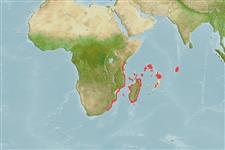Teleostei (teleosts) >
Gadiformes (Cods) >
Macrouridae (Grenadiers or rattails)
Etymology: Coelorinchus: Greek, koilos = a hollow + Greek, rhyngchos = jaw (Ref. 45335).
More on author: Regan.
Environment: milieu / climate zone / depth range / distribution range
Ecology
Marine; benthopelagic; non-migratory; depth range 64 - 335 m (Ref. 11953). Tropical; 2°S - 32°S
Western Indian Ocean: off Kenya to Natal, South Africa and Madagascar.
Size / Weight / Age
Maturity: Lm ? range ? - ? cm
Max length : 28.0 cm TL male/unsexed; (Ref. 11953)
Dorsal spines (total): 2; Dorsal soft rays (total): 108 - 109; Anal spines: 0; Anal soft rays: 100. Light organ a dark streak extending forward from anus to chest, streak broadened at either end but anterior fossa not broadly naked. Spinules on scales slender, conical, recurved, in irregular subparallel rows to somewhat quincunx pattern. Color is light brownish to gray-brown; with faint diagonal bands in some individuals. First dorsal fin with a dark band across the middle; the pelvic fins black-tipped, its base blackish.
Life cycle and mating behavior
Maturities | Reproduction | Spawnings | Egg(s) | Fecundities | Larvae
Iwamoto, T. and E. Anderson, 1994. Review of the grenadiers (Teleostei: Gadiformes) of southern Africa, with descriptions of four new species. Ichthyol. Bull. J.L.B. Smith Inst. Ichthyol. (61):1-28. (Ref. 11953)
IUCN Red List Status (Ref. 130435)
Threat to humans
Harmless
Human uses
Fisheries: of no interest
Tools
Special reports
Download XML
Internet sources
Estimates based on models
Preferred temperature (Ref.
123201): 15.6 - 22.1, mean 18.7 °C (based on 21 cells).
Phylogenetic diversity index (Ref.
82804): PD
50 = 0.5000 [Uniqueness, from 0.5 = low to 2.0 = high].
Bayesian length-weight: a=0.00251 (0.00128 - 0.00492), b=3.19 (3.03 - 3.35), in cm total length, based on LWR estimates for this Genus-body shape (Ref.
93245).
Trophic level (Ref.
69278): 3.5 ±0.5 se; based on size and trophs of closest relatives
Resilience (Ref.
120179): Medium, minimum population doubling time 1.4 - 4.4 years (Preliminary K or Fecundity.).
Fishing Vulnerability (Ref.
59153): Low vulnerability (18 of 100).
